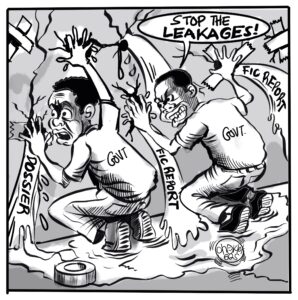A FRESH investigation into the supply of toxic drugs by HoneyBee Pharmacy has revealed that the firm actually submitted falsified financial statements to the Ministry of Health in order to win the US$17 million Health Centre Kits tender.
And the World Health Organisation (WHO) says it does not accredit any pharmaceutical manufacturing companies, contrary to claims by HoneyBee Pharmacy that the substandard drugs it supplied to the Ministry of Health in Zambia were sourced from manufacturers accredited by the global health institution.
Sources close to the investigation told News Diggers that apart from failing ZAMRA inspection, HoneyBee Pharmacy also submitted fake statements of account to the procurement committee, and the contract was awarded based on false information regarding the firm’s capacity to deliver specified goods in the bid.
According to bid documents seen by News Diggers, HoneyBee submitted financial statements purporting to have been audited by a company called I.Dore, to the effect that the Pharmacy had the financial capacity to execute the procurement of 22,500 Health Centre Kits within a delivery period of eight to 12 weeks.
“In our opinion, the financial statements give a true and fair view of the financial position of HoneyBee Pharmacy as at 31 December 2017, and of its performance and cashflows for the year then ended in accordance with the International Financial Reporting standards and the requirements of the Zambian Companies Act,” read the HoneyBee audit report, purportedly prepared by I.Dore company.
“…misstatements can arise from fraud or error and are considered material if, individually or in aggregate, they could reasonably be expected to influence the economic decision of users taken on the basis of these statements.”
But sources revealed that the audit firm distanced itself from HoneyBee when the audit report was brought under scrutiny.
“The only challenge we have here is that there is no green light yet to make arrests and prosecute this case, but we have the file. It’s a straightforward case of corruption and money laundering. For example, you are aware that HoneyBee failed ZAMRA inspection, but they were still given a licence illegally because they needed that licence to win the tender. Apart from that, they also provided an audit report from that company, I.Dore. As you could see from the bid, the financial statements submitted even had signatures, but when I.Dore was queried, they denied ever auditing HoneyBee. That’s the report we have, I.Dore distanced itself from the HoneyBee audit report, meaning this also becomes a case of investigation for ZICA, you might wish to ask them what they know about this,” the sources said.
“But you might also be looking at a possibility that there was collusion between HoneyBee and I.Dore because there is a trail of misinformation on the file. HoneyBee also claimed that they supplied drugs to Malawi and the South African government, but that has also been established as false. We have all that detail on file, what is remaining is sanction for us to move in. But like I said there is no push on this case at this stage, we don’t know…”
But when contacted Tuesday, I.Dore proprietor Ismail Dore said HoneyBee was his client and their dealings were confidential.
“Honey Bee is our client, I will not discuss issues about our client on the phone or with the media. We prioritise privacy. Just like a doctor who keeps a patient’s health private, I cannot just discuss issues about my client,” Ismail Dore said.
Meanwhile, the World Health Organisation has distanced itself from the HoneyBee claim that they supplied drugs sourced from WHO accredited manufacturers.
Early this month, HoneyBee Pharmacy manager Zackir Motala told News Diggers! that it collected all its medicines which it supplies to the Ministry of Health from WHO-accredited pharmaceutical manufacturers, when he was asked to explain the supply of toxic Paracetamol.
“All our medicine has been collected from WHO CNP accredited. If you know the system of pharmaceuticals, there is nothing like sub-standard. If there is anything sub-standard, there is a regulatory body. So, all these are governed by WHO. If there is any drug, which has probably discoloured or anything that is not fit for consumption, the regulatory body is contacted and then that medicine is recalled from the public. And it goes back to the manufacturer. So, before you even think of writing a screaming headline or before you even think of victimising us, because you have victimised us a lot, this is a chain. Us, we are the suppliers, and we go to the manufacturers. And the manufacturer has to have a WHO certification. And we only get drugs from WHO-certified manufacturers so that we don’t get anything from street vendors. So, when we get from WHO-certified manufacturers, we are also protected, and even the people of Zambia are going to be protected, and even the Ministry (of Health) is going to be protected,” Motala had said.
But in response to a press query, the WHO press office, through its media relations officer Hedinn Halldorsson, stated that the organisation did not accredit pharmaceutical companies.
“WHO does not accredit pharmaceutical companies. Through the WHO Prequalification programme, WHO facilitates access to safe and quality medical products: specific products may, therefore, be ‘pre-qualified’ upon having reached certain strict criteria. Pharmaceutical companies, which manufacture these products are not accredited by WHO, only designated products are. WHO proposes a range of solutions to ensure access to safe, effective, quality- and affordable medical products. For example, the manufacturing process of products that are referenced as pre-qualified would have been assessed and inspected by specialised staff. In other instances, WHO and international partners may set up procurement mechanisms whereby the purchase of essential medicines is streamlined for governments,” Halldorsson stated.
Halldorsson added that regulatory and judicial responses to sub-standard and falsified medical products varied by country and were subject to national sovereignty.
“Should any stakeholder wish to obtain a list or references of products, which have been validated by the WHO Pre-qualification programme, a full list of these is available on the WHO website. Regulatory and judicial responses to sub-standard and falsified medical products vary by country and are subject to national sovereignty. WHO does provide extensive support to member states in this area. If faulty products are supplied, this should be flagged as soon as possible to the supplier and the competent national regulatory authority. If you suspect that you are dealing with a sub-standard and/or falsified medical product, or are aware of harm caused by such a product, please alert your national authorities. You may also inform WHO by writing to [email protected],” stated Halldorsson.
























